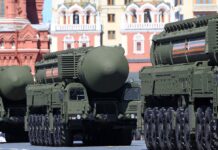The safety net that prevented a new Middle East catastrophe overnight has always been there. Neither the US nor Iran wants to go to war with each other. But it is a failsafe that has been tested too fecklessly too many times – and there is no reason to assume it will continue to hold indefinitely.
As more details emerge of the missile strikes on military bases in Iraq, it is becoming increasingly clear that Iran aimed to miss. Iraq’s government was tipped off so Americans and Iraqis had enough time to take cover. There are still no confirmed reports of casualties.
From Tehran’s point of view, there was a narrow range of options. To preserve the government’s legitimacy, the response to the killing of an icon of the revolution, Qassem Suleimani, had to be bold and look impressive on television. For good measure, Iranian media were seeded with stories of dozens of US casualties.
But the response could not be allowed to trigger a war that Iran would not win. The best it could hope for was an enormously destructive draw. Only the truly messianic would welcome such an outcome – those willing to hurl the nation into the abyss and put its fate in God’s hands.
Washington has its own messianic lobby which is arguably even more influential. Both the secretary of state, Mike Pompeo, and Vice-President Mike Pence represent a strand of evangelical Christianity which views events in the Middle East through the prism of biblical prophecy, with Iran playing the role of evil embodied hurtling towards an apocalyptic battle with the forces of good. Both Pompeo and Pence are reported to have urged Trump to pull the trigger on Suleimani.
In pushing for conflict with Iran, they have allies among traditional hardline conservatives. The leader of that group, John Bolton, has left the White House, but his influence lives on. But while they can cajole Trump into military action on occasion by playing on his fear of appearing weak the president remains deeply averse to all-out war, especially in an election year. It is one of the few relatively fixed points in his erratic approach to dealing with foreigners.
The relief and triumph with which Trump drove down the off-ramp Iran had provided was evident in his Wednesday morning speech.
None of the above is a guarantee against war. Iran may have intended to miss but if one of its missiles had gone astray and hit Americans, Trump would almost certainly have retaliated, and the cycle of escalation could easily have spun out of control.
In any case, it seems unlikely even this round of tit-for-tat retaliation is really over. Iran’s supreme leader, Ali Khamenei, said the missiles were just a “slap in the face” and insufficient remedy for the loss of Suleimani. It is a safe bet there is more to come, most likely from Iran’s allies and proxies in Iraq, whose leaders were killed by the same drone strike that killed the Iranian general.

The desire for revenge will supercharge the Iraqi militias’ central mission: to drive US forces out of Iraq, a goal that Suleimani pursued in life, and has come close to achieving with his death.
Iran has a wide choice of other fronts on which it can plot revenge, including the Persian Gulf oil shipping lanes, Saudi and Emirati infrastructure, and cyberwarfare. Past experience suggests that real revenge will be served cold, in a manner that makes its provenance clear to the intelligence services but impossible to prove to the public and US allies.
More importantly, both sides are still set on the same paths that lead straight to the brink. The fact that they managed to stop themselves falling over the edge this time is of small comfort if they are going to dust themselves off and race down the same course again.
The death of Suleimani is very unlikely to stop Iran from seeking to expand its influence through violence across the region, supplying weapons to the Houthis in Yemen, conducting its proxy campaign in Iraq to force out US troops, and most of all in Syria, where Iran is complicit in Bashar Assad’s war on his own people, itself a driver of extremism and instability.
And while Trump made conciliatory noises in his remarks on Wednesday, he also made it clear that dodging a bullet this time had only deepened his conviction that his campaign of maximum pressure was working, and that ultimately Iran would buckle to his demands.
Those demands, formulated by Pompeo, include a retreat from foreign military operations and a complete end to uranium enrichment. There is not the remotest chance Iran will agree to that. It is currently moving in the other direction, stepping up enrichment beyond the bounds agreed in the 2015 deal for which Trump reserved his greatest contempt on Wednesday.
That does not necessarily mean that Tehran has taken the decision to pursue a nuclear weapon, but the fawning respect with which Trump treats Kim Jong-un, compared with his demonisation of Tehran’s clerics, undoubtedly strengthens the incentives to do so.
The thing about maximum pressure is that it normally causes things to explode. The recurring surprise is that Trump administration continually expects something different.








